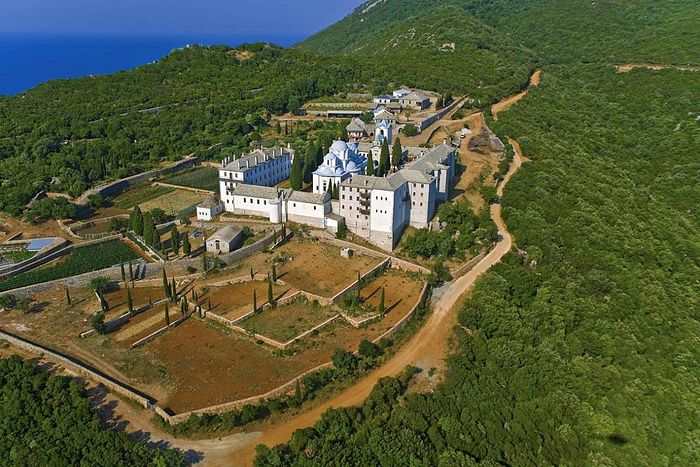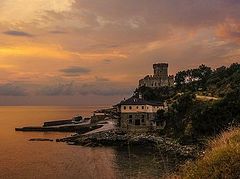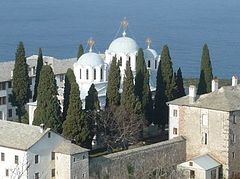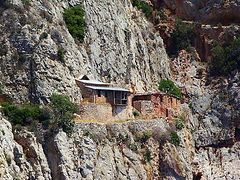Mt. Athos, October 12, 2017
The Athonite Romanian skete of Prodromou (St. John the Forerunner) has released an open letter that seeks to restore the truth about what happened in connection with the brotherhood’s statement on Ecumenical Patriarch Bartholomew after, as the authors write, “he contributed to the legalization of the heresy of Ecumenism by way of the so-called Holy and Great Council which took place in June 2016 on Crete.”
This latest statement from the skete is meant as a response to the communiqué that was published on the Romanian Patriarchate’s Basilica News Agency in June of this year, on behalf of the skete brotherhood, in which it was denied that the skete has ceased commemoration of Patriarch Bartholomew, or that the abbot of the Great Lavra, to which the skete belongs, interfered in the life of the skete in any way, reports Odigitria.
Hieroschemank Paisios of Prodromou states, “As a member of the synaxis of the Romanian Prodromou Skete, I can confirm that I knew nothing about the publication of the given communiqué as issued from Prodromou Skete, which is a deviation from the skete’s rules,” adding that any such substantive letter must be approved by the synaxis and signed by the abbot along with two annually elected officials. The communiqué, however, was signed only by abbot Archimandrite Athanasios “and the brethren in Christ together with me.”
Thus, the hieromonk concludes, “the document is illegal and invalid.”
According to the letter, while the communiqué claims the skete never ceased commemoration of the patriarch, the meeting of the skete’s synaxis on December 4, 2016, in fact voted 5-1 to cease commemoration, with only the abbot voting against it. Beginning that day, all the clergy serving in the skete, Hieromonks Paisios, Joel, Kallinikos, and Hierodeacon Matthew, no longer commemorated the patriarch in the Divine services, as a means of insulating themselves against Ecumenism.
A week later, a 4.5-hour meeting was held with representatives of the Great Lavra and the Prodromou brotherhood, after which, having failed to convince the brothers to resume commemoration, the Lavra representatives began to threaten the dissolution of the skete’s synaxis, and the imposition of a penance on those who contributed to the decision to suspend commemoration of the patriarch.
When asked his opinion, Hieroschamamonk Julian, the elder of skete, stated that he holds holy that which did the saints, referring to St. Justin Popovich’s teaching that Ecumenism is a pan-heresy, and thus he called for a continuation of the practice of non-commemoration. According to the communiqué posted on the patriarchate’s site, this confession of the elder was coerced.
Three days later, the skete received a letter from the Lavra imposing sanctions on the skete until the members of the synaxis arrived at the Lavra and returned to the practice of commemoration. It also ordered the formation of a new synaxis. According to the open letter, this practice is against the charter of Mt. Athos, and was protested in letter by the entire synaxis, including the abbot Archimandrite Athanasios, who the brothers of the skete know to have personally confessed that the Crete Council was a heretical robber council.
The difficult situation was worsened with Archimandrite Athanasios stepping down from the abbacy, but later returning under the condition that one monk would be removed from the synaxis. According to the letter, his return did not necessitate a return to commemorating the patriarch, but on the feast of Theophany, the abbot of the Great Lavra, who was invited by Archimandrite Athanasios, commemorated the patriarch at the skete. Two weeks later, the abbot of the skete demanded that all clergy return to the practice of commemorating the patriarch, and thus Frs. Paisios, Joel, and Matthew no longer serve.
According to the letter, under Archimandrite Athanasios’ pressure, the majority of the skete brotherhood has changed its mind about the Council in Crete and now supports the commemoration of the Ecumenical Patriarch at the Divine services.
The letter goes on to dispute the communiqué’s claim that “The purported information that five monks who separated themselves from the monastic body of the Skete through their non-participation in the liturgical life have been sequestered, placed under canon, persecuted or subjected to various pressures is untrue,” and offers extensive reasoning for why the non-commemorating monks believe their choice is correct and justified.





You are making the same mistake as those who attack people like Fr. Theodore Zisis--failing to distinguish between non-commemorating and schisming. Non-commemorating is based in canon law; schisming is a grave sin.